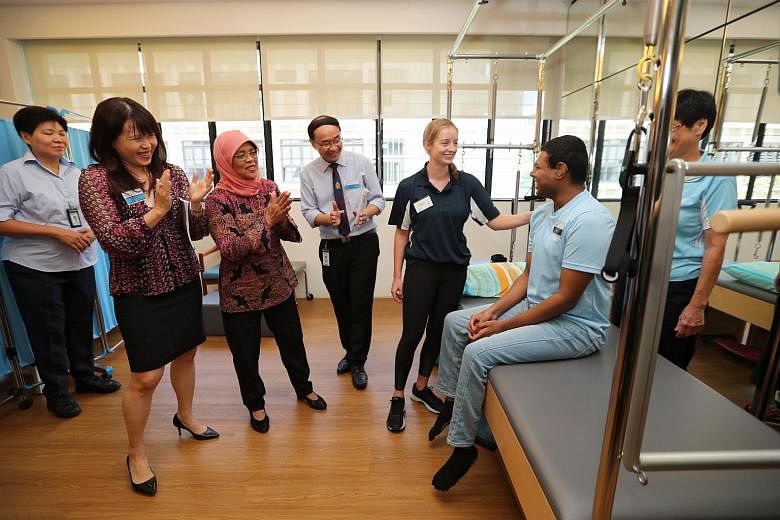SINGAPORE - President Halimah Yacob has called on bosses to devise a code of practice that will set common standards on the employment of people with disabilities.
These could include initiatives such as ramp access and modified computers screens.
Madam Halimah told the media at the rehabilitation and respite centre Abilities Beyond Limitations and Expectations (ABLE) on Tuesday (May 28) that such a code could create more jobs for people with disabilities.
While centres such as ABLE help support physically challenged clients reintegrate into the community and gain employment, there will be jobs available and we can "see in the labour market how to have a demand and supply matched together", she noted.
"I hope employers will do their part. Open their doors and be more receptive for people with disabilities to work and earn a living and have self-esteem."
Madam Halimah engaged with ABLE clients in various programmes during the one-hour visit, such as a baking class with family caregivers, a speech and language therapy session and rehabilitation therapy. She commended the centre's efforts to help people with disabilities enter the workforce.
ABLE chairman Serena Ho said: "Apart from training for a particular job skill, ABLE provides courses on resume writing, job interview presentation, work simulation exercises and job trials to prepare our clients for future employment."
Mr Ng Beng Chai, 59, has been attending the speech therapy sessions at ABLE for over a year. He had a stroke in February last year, causing severe aphasia, a language impairment that affects speech.
"Some don't even look at his abilities and skills. They don't seem to believe that cognitively he is able, when it is really just a language impairment," said Mr Ng's speech therapist, Ms Evelyn Khoo.
Mr Ng, who worked as a heavy vehicle driver for the past 30 years, has been repeatedly denied employment opportunities after his stroke.
He faces challenges dealing with service staff at hawker centres, coffee shops and supermarkets on a daily basis. However, his weekly speech therapy sessions have allowed him to to communicate more effectively than before despite his articulation being imprecise.
"I hope he is given a chance. I really hope I can help my clients achieve the goals that we set together, be it going to work or even being able to order food independently," said Ms Khoo.
ABLE served 174 rehabilitation clients between October 2015 and April 2019, with 44 returning to work.
It received Empowering for Life funding in 2018 and was granted a further two years under the President's Challenge. The funds will be used for its speech and language therapy programme as subsidies for their clients.




